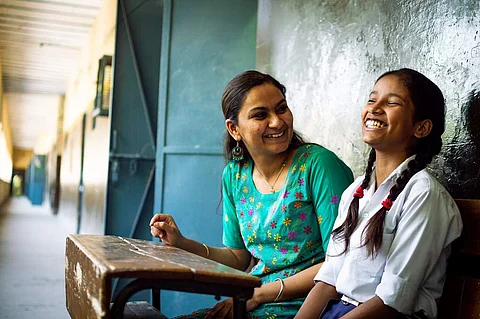

The behavioural issues of students are a direct reflection of the behaviour of parents, teachers, educational institutes, peer groups and social media. Students have been the victims of the COVID-19 pandemic. COVID has affected the mental health of the students significantly. It has increased their anxiety and stress level while lowering their optimism and confidence level. Students have found to be experiencing symptoms of burnout, although the underlying reasons may differ.
Constantly attending online classes and greater exposure to technological devices adds more exhaustion to the mind of the students. Students of higher education experience more exhaustion due to the demands of a hyper-competitive search for scholarships, internships or post-graduate work during an economic downturn. One invisible apprehension about getting a secure job juggles in their mind. Another pertinent reason for stress is detachment. It is more likely after almost one and half years of not spending time with peer learners in their respective academic institutions. Research indicates that this burnout symptom is not monolithic. This exhaustion can be depletion of mental or physical resources due to physical distance and detachment of social networks which may lead to a decreased sense of efficacy. This is otherwise known as cognitive load.
In this aspect, educators play a large role in students’ lives. Students spend more than eight hours (one-third of the day) virtually with the teachers. It is sufficient quality time for a teacher to build a deep meaningful relationship with their students. Psychological connectivity can be established when a teacher has the most significant impact (in terms of time spent) and through proper communication mediums to tie themselves with their learners. In a digital and virtual platform, it has got to be a big challenge for the teachers to grab the attention of the students. One of the most challenging aspects is to regulate the five senses in maintaining situational awareness of a classroom. For example, eye contact, pat on the back, body language and association with other students in the online class. Sometimes it appears to be a boring one because of two reasons, the teacher is not a good communicator or the student learners are not getting involved to learn the subject.
Our ongoing research is trying to explore what makes a good/successful teacher in such challenging times? A successful teacher during these trying times is the one who not only engages with their students but balances the interests of the student’s expectations. Hence, the teacher must ask three questions to himself or herself:
- What keeps your students engaged to reduce their cognitive load? (Academic engagement)
- Do you instill hope and positive energy in your students throughout the sessions? (Relational engagement)
- Do you sensitise students to be innovative in every approach? (Cognitive engagement)
Academic Engagement
Designing the curriculum for the students is the prime function of an educator. Keeping this in mind, they must design the course to maximise self-efficiency/confidence level where curiosity and learning will be high and minimise burnout stress. Hence, a teacher must ask this question — “Can I reuse the same material for the new batch that I am using prior to the pandemic?” Teachers must ask whether the course is challenging in the right dimensions — do students need to know everything about a certain topic, industry or situational-relevant content. Teachers must acknowledge students’ contributions and feedback which will help them facilitate the limited and time-specific discussion, making the experience enriching. Many of us have heard the saying, “Education is not the filling of a pail, but the lighting of a fire.”
Relational Engagement
It refers to the teacher's social belonging, social integration, inclusion and involvement — the degree to which students feel supported by and connected to their teachers. Here, the teacher must be self-responsible towards their words and actions. Instead of judging, criticising and blaming, the teacher/instructor should create positive energy in the online classroom. Though the students are virtually connected, there must be a kind of psychological attachment between teacher and students. Psychological engagement can be possible in these ways:
- Remembering students’ names and calling patterns
- Reading online chat windows
- Keeping track of time
- Maintaining eye contact
- Monitoring students’ body language
Relational engagement is all about showing the students how much a teacher cares. Here, teachers must exhibit empathy and compassion to deeply understand students' personal and social situations, to care and feel concerned in response to students' positive and negative emotions and to respond compassionately without losing focus from student learning.
Cognitive Engagement
Finally, higher education must be operationalised for cognitive engagement in several ways. Research shows that meaningful learning is predicated on the quality of cognitive engagement. It constructs deep learning (the way faculty promote higher-order thinking and analysis through case analysis and integration of learning). Deep cognitive processing allows for the kind of mental connection and knowledge elaboration that fosters higher-level cognitive learning. This type of engagement heavily depends on the specific strategy, task or activity linked to societal problems developed by the educator. The said technique can also be utilised to develop a growth mindset. It depends on collaborative learning to leverage cognitive development where students can think out of the box. Students can build anti-fragile skills to focus on progress in the face of adversity.
Kalpana Sahoo is an Assistant Professor (OB) and Lalatendu Kesari Jena is an Assistant Professor (HRM) at School of Human Resource Management, XIM University, Bhubaneswar. Views expressed are their own
